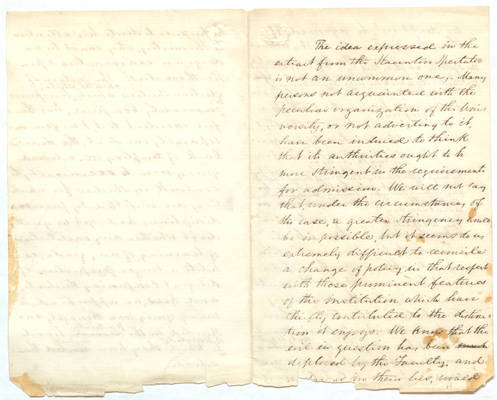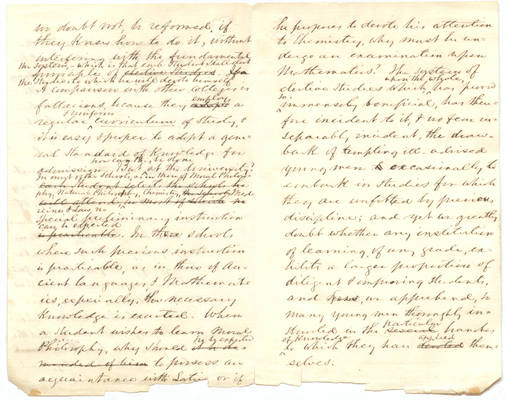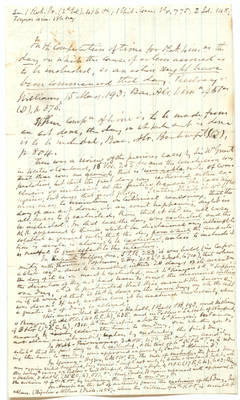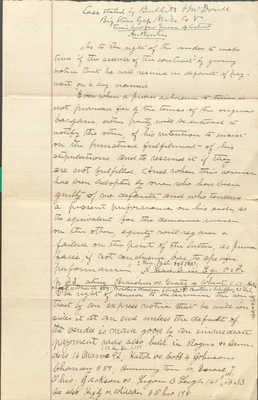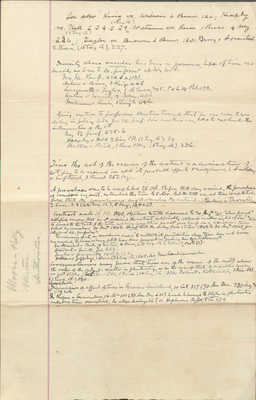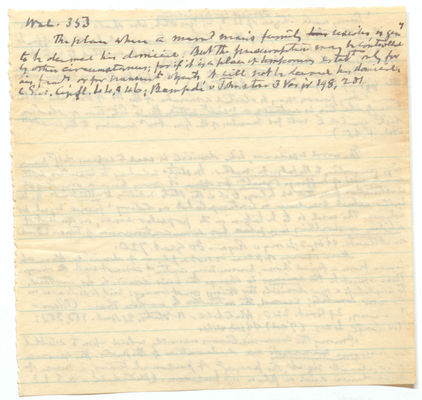Pages That Need Review
Eight Topics for the Board, undated
Page 2
on third $1000, [15?] W ct, & on residue 75 W ct, [?] so that the emolments of a [professor?], shd in [?] can be reduced by the tax, below $3500.
VI. Danger of withdrawal of annuity. [?] report exhibits balance of upwards of $25000 in Bursar's hands
VII. Danger of Legislature limiting fees, as well as withdrawing annuity, thus cutting off large [?] of support from both professor & Univ.
VIII. Increased salaries elsewhere as at [Columbia?]
Note on Admissions Standard at the University, undated
Page 1
The idea expressed in the extract from the Staunton Spectator is not an uncommon one. Many persons not acquainted with the peculiar organization of the Univversity, or not adverting to it, has been induced to think that its authorities ought to be more stringent in the requirements for admission. We will not say that under the circumstances of the case, a greater stringency would be impossible, but it seems to us extemely difficult to reconcile a change of policy in that respect with those prominent features of the institution which have chiefly contributed to the distincttion it enjoys. We know that the evil in question has been much deplored by the Faculty and [illegible] as in there lies, would
Page 2
in doubt not, [be?] reformed, if they knew how to do it, without interfering with the fundamental principle of {elective studies]}. {[If a?]} the system - which is that each student shall elect the studies to which he will devote himself
A comparison with other colleges is fallacious because they employ {illegible} a regular + uniform curriculum of study, + it is easy + proper to adopt a general standard of knowledge for admission. But how can this be done at this University? In most other schools, as in those of Moral Philoso{each Student selects the school, he} phy, Natural Philosophy, Chemistry, {the school}, Med{could attend in most of which no?]} icines + Law, no Special preliminary institution can be exected {is practicable.]} In the schools where such previous instruction is practicable, as in those of Ancient languages, + Mathematics, especially, the necessary knowledge is executed. When a student wishes to learn Natural Philosophy, why should he be expected to posessess any acquaintance with Latin or if
he prepares to devote his attention to Chemistry, why must he undergo an examination upon Mathematics? The system of elective studies which upon the whole has proved so immensely beneficial, has therefore incident to it, + no fear inseparable incident the drawback of tempting ill advised young men to occasionally to embark in studies for which they are unfitted by [previous?[ discipline; and yet we greatly doubt whether any instutiton of learning, if any grade, inhibits a larger proposition of diligent + empowering students, and [illeg.], we apprehend, so many young men thoroughly in stunted in the particular handles of knowledge to which they have applied themselves.
Answer to Fulmore Question on Statute of Limitations, undated
Page 2
Sec 1 Rob. Pr. [2 (?)]. 416th; 1 (?) Gen, Pr. 775: 2 (?) 148;
In the Consideration of time for Stat. (?) the day on which the cause of action [asumed?] is to be included, as an action might have been commenced that day. (?) Williams, 15 Mar. 193; (Bac?) (Alv?)(Liion?) of [?] [D], p 376
When (Compn?) of time is to be made from an but done, the day on (?) out is done is to be included. Bac, Abr. (?) [Q] p 804.
There was a review of the previous cases by Sir W Grant in [?] v [?] 18 Ves, 255 etc. and the conclusion was that there was no general, that is "invariable" rule of compenstation but that the first day was (?) in either exclusion or inclusion, as the justice reason the case might require; but says that 'great pledge' "I rather think it wd be more easy to maintain on testimonial reasoning, that the day of an act done, or an event happening, ought in all cases to be [?}] than that it shd in all cases be included". In that case the day was [?] and the M.R. appeared to think, whilst he disdained any attempt to establish a general rule that the day from which the computation is made is always to be excluded, unless to include it is (useful?) to give effect to the intention.
In [?] [?] [?] 5T.R. 283 it was held in ( [?] mity with Thomas v Popham, 2 [?] 218 & 2 Inst. 674) that when a State. reqd a deed to be enrolled within 20 days of its execution the day of its ex'on must be [excluded?], and [?] Kenyon sd "Suppose the direction of the act had been to enrol the memorial within one day, cd it be pretended that this meant the same thing as if is were sd that is shd be done on the same day on the act was done? If not, neither can it be continued exclusively, when a greater no. of days is allowed".
This cased indeed (?) o Fox Hall 1 Ball, 193, and (?) (?) 12 House [40 E.C.H.] 635 and in (?) Pellow (?) (?) a (?) 134, (?)
Case Stated by Bullitt and McDonell. undated
Page 1
Case stated by Bullitt & McDowell Big Stone Gap Wise Co. Va
Terni Law for (...) & [Contract] Authorities
As to the right of the vendor to make time "of the essence of the contract" by giving notice that he will rescind in default of payment on a day named.
"Even when a precise adherence to time is not provided for by the terms of the original bargain, either party will be entitled to notify the other, of his intention to insist on the punctual fulfilment of his stipulations and to rescind it if they are not fulfilled. And when this course has been adopted by one who has been guilty of no default, and who tenders a [??] performance on his side, as the equivalent for the demand made on the other, equity will regard a failure on the part of the latter, as prima facie if not conclusive bar to specific performance." 2 Miss. Insts. 895 (top); [??] [??] in Eq. V2 P2 n 33 citing Braishier vs. Gratz 4 Wheat. 528 Hatch Cobb. 4 Jones ch. 559: Bowles v Woodson, 4 Grat. 75; Booten v. Scheffer 21 Grat. 474-491
The right of vendor to determine the contract by an express notice that he will consider it at an end unless the default of the vendee is made good by an immediate payment was also held in Rogers vs. Saunders 16 Marine 92. (33 Am. De. 635). Hatch vs. Cobb 4 Johnsons Chancery 559; [Bennington?] vs. Israel 7 Ohio; Jackson vs. [Ligien?] 3 Leigh 161, 188" if 33 see also Higly vs. Whitaker 8 Ohio 198
Page 2
[At margin: Moon - Kelly Matter Authorities]
See also King vs. Wilson 6 Reav. 126; Heaphy vs. Hill 2 S & S 29 (1 Eng. Ch.). Watson vs. Reid 1 Russ & (...) 226 (5 Eng Ch); Taylor vs. Brown 2 Beav. 183. Berry v. Armistead 2 Keen (15 Eng Ch). 227.
[Diversity?] where vendor has been in (possession?) lapse of time (shd?) [Instly?] no (bar?) to (...) performed at his (...). (...) (...) (...) 426 & n(13). Miller v. Bean. 3 Paige 4 (...) (...) v. Taylor. 1 M (...) 395. T s 14 Pet. 172. (...) v. (...), 9 Johns. 452 [Williams?] v. Lewis, 5 Leigh 686.
Giving notice to perform shortens [time?] so that in one case 2 yrs delay in [filing?] bill for (...) perf. (...) another one held to [include?] the intervention of the ct. (...) (...) (...) 425-6 Hea(...) v. Hill 2 Sims. & (...) (1 Eng. (...)) Watson v. [Rind?], 1 (...) & My. (5 Eng. (...) 236.
(...) tho not of [essence?] of the contract is a circumstance of (...) & is to be viewed in all its probable effects & (consequences?). Anthony v. (Leftwich?), 3 Rand 252 & (...).
A purchase was to be completed 25 Ocxt. Before that day arrived the purchaser at vendor's request, extended the time to 5 Nov. But the title was not then completed. Held that the purchaser might abandon the contract. (Perkins v. Thorold. 2 Sim. N. S. (42 (Eng?) (Ch?)). 5 (...), 1 & n (1).
Contract made 16 Oct. 1840, objections to title discussed to 20 Augt. '41. When purchaser notified vendor that he wd. rescind the contract, but finally allowed vendor until 17 Jany "42 to complete the title, & the title not being compl(eted?) purchaser fell back on a (...). Bill filed by vendor, 30 August 1843. Hold that the delay from 17 Jany 1842 to 30 Augt. 1843, (...) sp. (...).
Tendency of cts. in modern cases to restrict its jurisdiction when time has not been regarded to cases where plt has been prompt in seeking his (...). South(...) v. Bish. of Exeter, 6 Hare (31 Eng. Ch),, 218-19 & note [1]. Stewart v. Smith, Id. 222 Taylor v. Longworth, 14 (...) 172 Walker v. Jeffreys, 1 Hare (23 Eng. Ch.) 348, Sir Jno (...)
Circumstances may prove that time was of the essence & the contl. where the value of the subject matter is fluctuating, as in the case of (start?) of a public house or (govt?) (...). (...) v. Till, 1 Russ. (1 Eng. Ch.) 376; Doloret v. Rothschild, 1 (...) (...) (1 Eng. Ch.) 590. Good & (...)
Discussion of effect of time in Green v. Covilland 10 Cal. 317 (70 Am. Dec. 730 (...) 139 nots.
In Rogers v. Saunders 16 (...) 107 (33 Am. Dec. 635) 4 (...) (...) to stocks in fluctuating value (& so?) essential. to also (...) (...) in Hepburn v. [Aula?], 5 Cr. 279
Notes on the Definition of Domicile for Lawmakers
Page 1
[Wal?]. 353
The place where a married man's family [strike]his[/strike] resides is gen'ly [GENERALLY] to be deemed his domicile. But the presumption may be controlled by other circumstances; for if it is a place of temporary estab't [ESTABLISHMENT] only for in [?form'r?], or for transient [objects?] it will not be deemed his domicile, C [Stor?]. [Cin Sl?]., 44, & 46; [Bempdi?] v [VERSUS] Johnstone, 3 [Vol?] [VOLUME?] iv 198, [201?]

